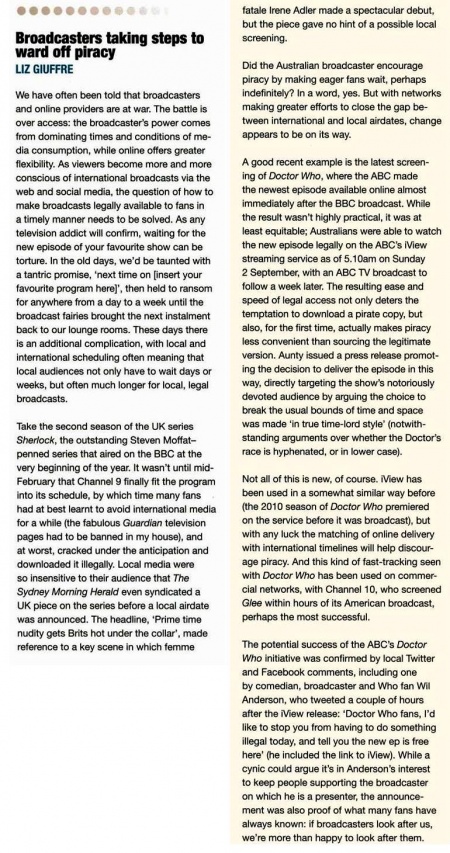Broadcasters taking steps to ward off piracy
- Publication: Metro (Australia)
- Date: September 2012
- Author: Liz Giuffre
- Page: 109
- Language: English
We have often been told that broadcasters and online providers are at war. The battle is over access: the broadcaster's power comes from dominating times and conditions of media consumption, while online offers greater flexibility. As viewers become more and more conscious of international broadcasts via the web and social media, the question of how to make broadcasts legally available to fans in a timely manner needs to be solved. As any television addict will confirm, waiting for the new episode of your favourite show can be torture. In the old days, we'd be taunted with a tantric promise, 'next time on [insert your favourite program here]', then held to ransom for anywhere from a day to a week until the broadcast fairies brought the next instalment back to our lounge rooms. These days there is an additional complication, with local and international scheduling often meaning that local audiences not only have to wait days or weeks, but often much longer for local, legal broadcasts.
Take the second season of the UK series Sherlock, the outstanding Steven Moffat-penned series that aired on the BBC at the very beginning of the year. It wasn't until mid-February that Channel 9 finally fit the program into its schedule, by which time many fans had at best learnt to avoid international media for a while (the fabulous Guardian television pages had to be banned in my house), and at worst, cracked under the anticipation and downloaded it illegally. Local media were so insensitive to their audience that The Sydney Morning Herald even syndicated a UK piece on the series before a local airdate was announced. The headline, 'Prime time nudity gets Brits hot under the collar', made reference to a key scene in which femme fatale Irene Adler made a spectacular debut, but the piece gave no hint of a possible local screening.
Did the Australian broadcaster encourage piracy by making eager fans wait, perhaps indefinitely? In a word, yes. But with networks making greater efforts to close the gap between international and local airdates, change appears to be on its way.
A good recent example is the latest screening of Doctor Who, where the ABC made the newest episode available online almost immediately after the BBC broadcast. While the result wasn't highly practical, it was at least equitable; Australians were able to watch the new episode legally on the ABC's iView streaming service as of 5.10am on Sunday 2 September, with an ABC TV broadcast to follow a week later. The resulting ease and speed of legal access not only deters the temptation to download a pirate copy, but also, for the first time, actually makes piracy less convenient than sourcing the legitimate version. Aunty issued a press release promoting the decision to deliver the episode in this way, directly targeting the show's notoriously devoted audience by arguing the choice to break the usual bounds of time and space was made 'in true time-lord style' (notwithstanding arguments over whether the Doctor's race is hyphenated, or in lower case).
Not all of this is new, of course. Mew has been used in a somewhat similar way before (the 2010 season of Doctor Who premiered on the service before it was broadcast), but with any luck the matching of online delivery with international timelines will help discourage piracy. And this kind of fast-tracking seen with Doctor Who has been used on commercial networks, with Channel 10, who screened Glee within hours of its American broadcast, perhaps the most successful.
The potential success of the ABC's Doctor Who initiative was confirmed by local Twitter and Facebook comments, including one by comedian, broadcaster and Who fan Wil Anderson, who tweeted a couple of hours after the iView release: 'Doctor Who fans, I'd like to stop you from having to do something illegal today, and tell you the new ep is free here' (he included the link to iView). While a cynic could argue it's in Anderson's interest to keep people supporting the broadcaster on which he is a presenter, the announcement was also proof of what many fans have always known: if broadcasters look after us, we're more than happy to look after them.
Disclaimer: These citations are created on-the-fly using primitive parsing techniques. You should double-check all citations. Send feedback to whovian@cuttingsarchive.org
- APA 6th ed.: Giuffre, Liz (September 2012). Broadcasters taking steps to ward off piracy. Metro (Australia) p. 109.
- MLA 7th ed.: Giuffre, Liz. "Broadcasters taking steps to ward off piracy." Metro (Australia) [add city] September 2012, 109. Print.
- Chicago 15th ed.: Giuffre, Liz. "Broadcasters taking steps to ward off piracy." Metro (Australia), edition, sec., September 2012
- Turabian: Giuffre, Liz. "Broadcasters taking steps to ward off piracy." Metro (Australia), September 2012, section, 109 edition.
- Wikipedia (this article): <ref>{{cite news| title=Broadcasters taking steps to ward off piracy | url=http://cuttingsarchive.org/index.php/Broadcasters_taking_steps_to_ward_off_piracy | work=Metro (Australia) | pages=109 | date=September 2012 | via=Doctor Who Cuttings Archive | accessdate=15 December 2025 }}</ref>
- Wikipedia (this page): <ref>{{cite web | title=Broadcasters taking steps to ward off piracy | url=http://cuttingsarchive.org/index.php/Broadcasters_taking_steps_to_ward_off_piracy | work=Doctor Who Cuttings Archive | accessdate=15 December 2025}}</ref>
